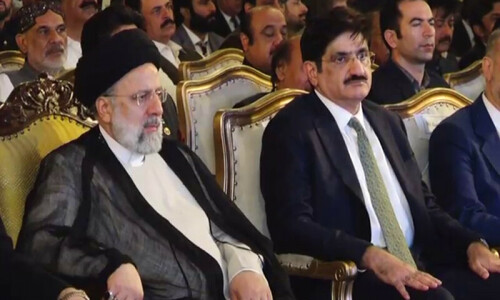
ISLAMABAD: Inter-Services Public Relations (ISPR) director general Maj Gen Babar Iftikhar on Thursday warned against testing Pakistan’s capability and resolve, saying the country would give a telling response in case of a challenge to its security.
“There is no space for war between two nuclear powers. The consequences for that will be uncontrollable and things will spiral out of control. Intentions can change overnight but capabilities remain,” he told a press conference. “If there is a war in the region, there will be far-reaching consequences.”
The press conference was held on the first anniversary of the ‘Operation Swift Retort’ in which two Indian planes were downed for violating Pakistan’s airspace. Also, it was Maj Gen Iftikhar’s first major media interaction after he became the chief of the ISPR earlier this month.
To a question, he said although India was among the world’s top three countries for military spending, Pakistan was 100 per cent capable of defending its geographic boundaries. “We will not let any harm come to our country.”
He said Pakistan was aware of all covert and overt operations of its enemies and was prepared for all scenarios.
He said the country’s civil and military leadership was aware of the game being played by India.
India violated LoC 384 times
He said that Jammu and Kashmir was an internationally recognised dispute between India and Pakistan.
“After the Pulwama incident, India blamed Pakistan. We offered all cooperation, but on Feb 26 [2019] they carried out a cowardly attack. We were prepared. The surprise they wanted to give to us, we gave to them instead and they retreated,” he said.
Speaking on violations carried out by India across the Line of Control (LoC), he said that there had been “384 violations” during the past year.
“They do not spare children on their way to school. The Pakistan Army is a responsible force; when we are provoked we respond against military targets, while the Indian forces target civilians,” he said.
He said the people of India-held Kashmir had been facing major violence and oppression for the last 207 days of lockdown.
He said international media and human rights bodies had unmasked the violence in the occupied territory and there were protests in India against it.
The United Nations chief had also called for ending the oppression in the occupied valley,” he said, adding that a solution to the Kashmir issue was linked with Pakistan’s national interest.
“We stood with Kashmiris in the past and will do so in future. The entire world is aware of what is going on in Kashmir and we feel for the people of the valley.
“All our options are on the table. This dispute is being viewed as a flashpoint, we are moving towards a solution but the pace of this is not what it should be,” the ISPR chief added.
US-Taliban peace deal
Speaking about operation Raddul Fasaad, which was launched in February 2017 in the aftermath of a fresh wave of terror attacks in Pakistan, he said the operation had normalised the country.
“We claimed one million acres of land back from terrorists. The journey from terrorism to tourism has been a difficult one and the people also played a part in this. Our cricket grounds are now filled once again,” he said.
Commenting on the US-Taliban peace deal set to take place on Saturday, Gen Iftikhar stated that while this was the domain of the Foreign Office, there were no reports of delay in signing of the deal. “There will be positive results from this deal. Nobody wants peace in Afghanistan more than Pakistan. We are hoping for the best,” he said.
He said there was nothing wrong with Pakistan’s relationship with Afghanistan.
“We have a very cordial and good relationship. As far as this peace accord is concerned, Pakistan has done its best to facilitate this [deal], and that has been acknowledged unanimously by everyone. I don’t see any reasons for our relations with Afghanistan going sour,” he added.
When asked about the two coronavirus cases reported in the country, the ISPR chief said that the health ministry was tackling the situation effectively.
“The virus was spreading in neighbouring countries and now two cases have been reported in Pakistan. As far as the armed forces are concerned, we are absolutely ready to help out as and when the government asks us and all our facilities are on alert,” he said, adding that military representatives were also part of the conferences called to review the situation in the country.
Published in Dawn, February 28th, 2020












































